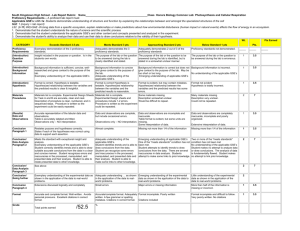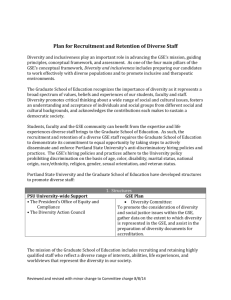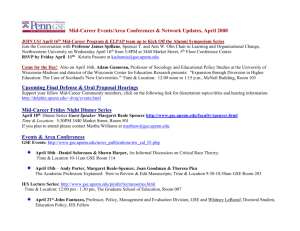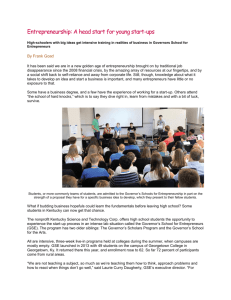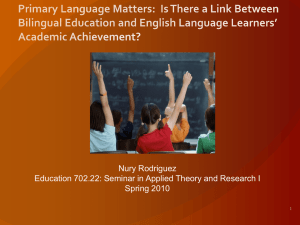Catalase Lab Honors Rubric
advertisement
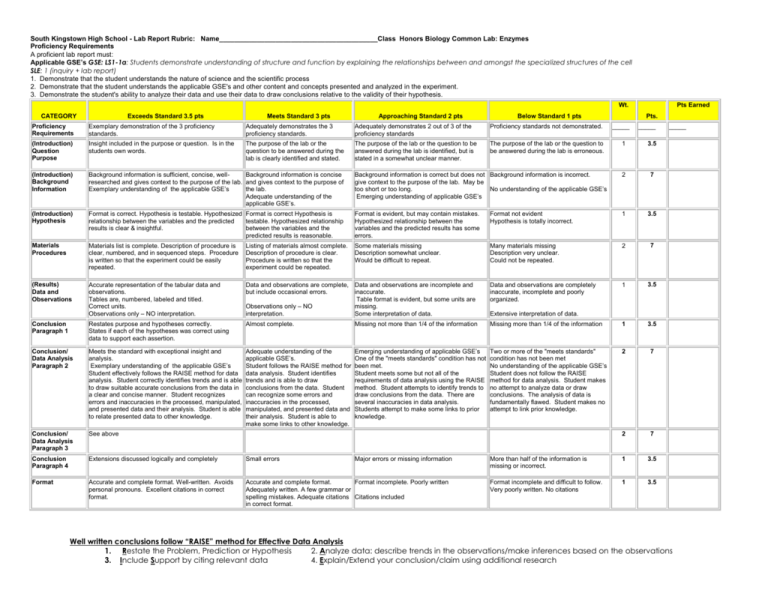
South Kingstown High School - Lab Report Rubric: Name__________________________________________Class Honors Biology Common Lab: Enzymes Proficiency Requirements A proficient lab report must: Applicable GSE’s GSE: LS1-1a: Students demonstrate understanding of structure and function by explaining the relationships between and amongst the specialized structures of the cell SLE: 1 (inquiry + lab report) 1. Demonstrate that the student understands the nature of science and the scientific process 2. Demonstrate that the student understands the applicable GSE's and other content and concepts presented and analyzed in the experiment. 3. Demonstrate the student's ability to analyze their data and use their data to draw conclusions relative to the validity of their hypothesis. Wt. CATEGORY Exceeds Standard 3.5 pts Meets Standard 3 pts Approaching Standard 2 pts Below Standard 1 pts Proficiency Requirements Exemplary demonstration of the 3 proficiency standards. Adequately demonstrates the 3 proficiency standards. Adequately demonstrates 2 out of 3 of the proficiency standards Proficiency standards not demonstrated. (Introduction) Question Purpose Insight included in the purpose or question. Is in the students own words. The purpose of the lab or the question to be answered during the lab is clearly identified and stated. The purpose of the lab or the question to be answered during the lab is identified, but is stated in a somewhat unclear manner. The purpose of the lab or the question to be answered during the lab is erroneous. (Introduction) Background Information Background information is sufficient, concise, wellBackground information is concise researched and gives context to the purpose of the lab. and gives context to the purpose of Exemplary understanding of the applicable GSE’s the lab. Adequate understanding of the applicable GSE’s. (Introduction) Hypothesis Pts Earned Pts. _____ _____ 1 3.5 Background information is correct but does not Background information is incorrect. give context to the purpose of the lab. May be too short or too long. No understanding of the applicable GSE’s Emerging understanding of applicable GSE’s 2 7 Format is correct. Hypothesis is testable. Hypothesized Format is correct Hypothesis is relationship between the variables and the predicted testable. Hypothesized relationship results is clear & insightful. between the variables and the predicted results is reasonable. Format is evident, but may contain mistakes. Hypothesized relationship between the variables and the predicted results has some errors. Format not evident Hypothesis is totally incorrect. 1 3.5 Materials Procedures Materials list is complete. Description of procedure is clear, numbered, and in sequenced steps. Procedure is written so that the experiment could be easily repeated. Listing of materials almost complete. Description of procedure is clear. Procedure is written so that the experiment could be repeated. Some materials missing Description somewhat unclear. Would be difficult to repeat. Many materials missing Description very unclear. Could not be repeated. 2 7 (Results) Data and Observations Accurate representation of the tabular data and observations. Tables are, numbered, labeled and titled. Correct units. Observations only – NO interpretation. Data and observations are complete, Data and observations are incomplete and but include occasional errors. inaccurate. Table format is evident, but some units are Observations only – NO missing. interpretation. Some interpretation of data. Data and observations are completely inaccurate, incomplete and poorly organized. 1 3.5 Conclusion Paragraph 1 Restates purpose and hypotheses correctly. States if each of the hypotheses was correct using data to support each assertion. Almost complete. Missing not more than 1/4 of the information Missing more than 1/4 of the information 1 3.5 Conclusion/ Data Analysis Paragraph 2 Meets the standard with exceptional insight and analysis. Exemplary understanding of the applicable GSE’s Student effectively follows the RAISE method for data analysis. Student correctly identifies trends and is able to draw suitable accurate conclusions from the data in a clear and concise manner. Student recognizes errors and inaccuracies in the processed, manipulated, and presented data and their analysis. Student is able to relate presented data to other knowledge. Adequate understanding of the applicable GSE’s. Student follows the RAISE method for data analysis. Student identifies trends and is able to draw conclusions from the data. Student can recognize some errors and inaccuracies in the processed, manipulated, and presented data and their analysis. Student is able to make some links to other knowledge. Emerging understanding of applicable GSE’s One of the "meets standards" condition has not been met. Student meets some but not all of the requirements of data analysis using the RAISE method. Student attempts to identify trends to draw conclusions from the data. There are several inaccuracies in data analysis. Students attempt to make some links to prior knowledge. Two or more of the "meets standards" condition has not been met No understanding of the applicable GSE’s Student does not follow the RAISE method for data analysis. Student makes no attempt to analyze data or draw conclusions. The analysis of data is fundamentally flawed. Student makes no attempt to link prior knowledge. 2 7 Conclusion/ Data Analysis Paragraph 3 See above 2 7 Conclusion Paragraph 4 Extensions discussed logically and completely Small errors More than half of the information is missing or incorrect. 1 3.5 Format Accurate and complete format. Well-written. Avoids personal pronouns. Excellent citations in correct format. Accurate and complete format. Format incomplete. Poorly written Adequately written. A few grammar or spelling mistakes. Adequate citations Citations included in correct format. Format incomplete and difficult to follow. Very poorly written. No citations 1 3.5 Major errors or missing information _____ Extensive interpretation of data. Well written conclusions follow “RAISE” method for Effective Data Analysis 1. Restate the Problem, Prediction or Hypothesis 2. Analyze data: describe trends in the observations/make inferences based on the observations 3. Include Support by citing relevant data 4. Explain/Extend your conclusion/claim using additional research
